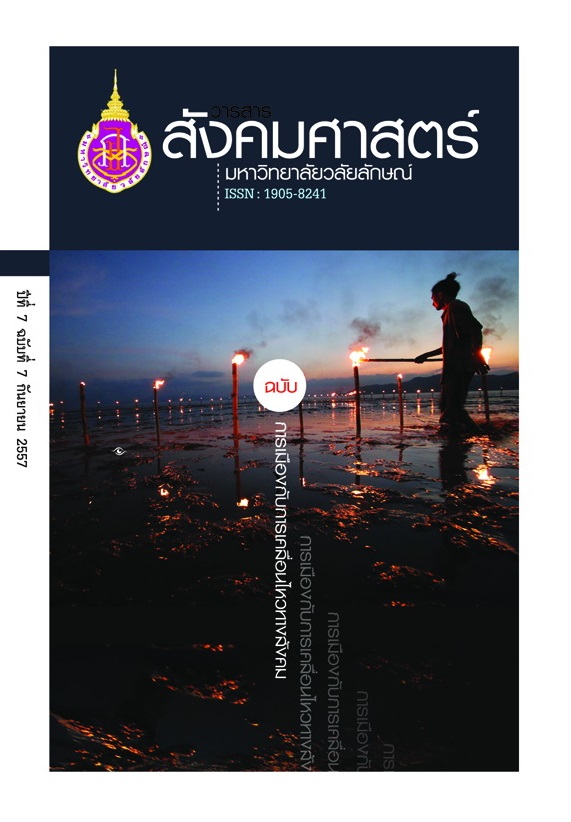Slavoj Zizek and the anticipation of divine violence: divine violence as political means in the 21st century (in Thai)
Main Article Content
Abstract
This article considers on violence in the philosophy of Slavoj Zizek. The article hypothesizes that violence is a means to attain the political ends. If violence is the means to attain the political ends, violence ought not to be defined as human instinct. Zizek’s viewpoint on violence was explicit in a book called On Violence (2008) to which Zizek understood violence that was significantly initiated by a group of people who resist the state. Zizek attempted to understand violence through the lens of people whose political rights were of depraved and were to be politically undermined of social equality. Violence that Zizek sought to apprehend is not violence initiated by state but by a disadvantageous people. Violence that Zizek maintains in his recognition is situated in the context of class exploitation, which has been carrying out by the privilege class in the capitalism society. Zizek’s violence is also a critique of the idealistic attitude of liberal democracy, which is resulted in the people’s disavowal of their obligation to the state as long as alliances between state and corporatism are concerned. Instead, people have been viewing state as a traitor of the humanitarian principle, which maintains the view that state is rather an offender to the principle of liberal democracy. Zizek develops the view on violence from the thesis of violence by Walter Benjamin, who distinguishes violence in two categories. The first category of violence is a violence exercised by state as equally a political actor in forging a legal legitimacy. Violence exercised by state, such as the coup de tat, does not lead to a restructuration of the existing politics and economics characterized by inequality. Violence exercised by state exacerbates law, order, and social structure to preserve its status quo. Zizek shares this thesis on violence of Benjamin, who maintains that violence by state is the “law-preserving violence”. Meanwhile, divine violence is another category of violence to which Zizek borrowed from Benjamin’s thesison theology, by adapting it in a context of secularism. Zizek’s divine violence determines a majority of people to run a course of violence in order to transform the existing social condition. Zizek’s divine violence is situated in a different context to Benjamin’s and becomes the condition of violence that is linking to the expectation of social revolution against capitalism and to the triumphant of the communist fellows in the 21st Century.
สลาวอย ซิเซ็กกับความวาดฝันต่อความรุนแรงเทวะ: ความรุนแรงเทวะในสถานะวิธีการทางการเมืองแห่งศตวรรษที่ 21
บทความชิ้นนี้พิจารณาความรุนแรงในทัศนะปรัชญาของสลาวอย ซิเซ็ก บทความมี สมมติฐานว่าความรุนแรงเป็นเรื่องของวิธีการ ทางการเมืองเพื่อบรรลุผลลัพธ์ทางการเมือง เมื่อความรุนแรงเป็นวิธีการเพื่อเป้าสัมฤทธิ์ ทางการเมือง ความรุนแรงจึงมิควรนิยามว่าเป็น เพียงสัญชาติญาณมนุษย์เท่านั้น ความคิดเรื่อง ความรุนแรงปรากฏชัดเจนในหนังสือ Violence (2008) ซึ่งซิเซ็กทำความเข้าใจความรุนแรงที่ก่อ ขึ้นโดยกลุ่มคนที่ต่อต้านรัฐเป็นสำคัญ ซิเซ็ก พยายามเข้าใจความรุนแรงผ่านสายตาของคนที่ ถูกตัดสิทธิและถูกลิดรอนความเสมอภาคทาง การเมืองซึ่งเป็นคนส่วนใหญ่ของสังคม ความรุนแรงที่ซิเซ็กสนใจจึงไม่ใช่ความรุนแรงที่ริเริ่ม โดยรัฐ แต่เป็นความรุนแรงที่ริเริ่มโดยกลุ่มคนที่เป็นผู้เสียเปรียบของสังคม ความรุนแรงที่ซิเซ็กมุ่งเข้าใจอยู่ภายใต้บริบทของการเอารัดเอาเปรียบทางชนชั้นของชนชั้นที่ได้เปรียบในสังคม ทุนนิยม ความรุนแรงของซิเซ็กยังเป็นการวิพากษ์ความเป็นอุดมคติ ของเสรีนิยมประชาธิปไตยที่ส่งผลให้คนส่วนใหญ่เลิกเคารพรัฐที่ร่วม มือกับชนชั้นนายทุนในฐานะผู้ปกครอง แต่มองรัฐที่ร่วมมือกับชนชั้น นายทุนในฐานะผู้ทรยศต่อหลักการความเป็นมนุษย์ ซึ่งนับเป็นการขบ คิดถึงรัฐในฐานะผู้ทำลายหลักการของเสรีนิยมประชาธิปไตย ซิเซ็ก พัฒนาแนวคิดเรื่องความรุนแรงจากสารนิพนธ์ของวอลเทอร์เบนญามิน ปราชญ์ผู้แยกความรุนแรงเป็นสองแนวทาง ความรุนแรงในแนวทาง แรกเป็นความรุนแรงทางการเมืองที่ก่อขึ้นโดยรัฐผู้เป็นตัวแสดงทาง การเมืองในการวางระเบียบกฎเกณฑ์ ความรุนแรงที่ก่อขึ้นโดยรัฐ เช่น รัฐประหาร การยึดอำนาจ ฯลฯ เป็นความรุนแรงที่ไม่นำพาไปสู่การ เปลี่ยนแปลงโครงสร้างทางการเมืองและเศรษฐกิจที่ไม่เสมอภาค อย่างที่เป็นอยู่ ความรุนแรงโดยรัฐกลับยิ่งตอกย้ำให้กฎระเบียบและ โครงสร้างสังคมที่เป็นมายังคงสงวนเป็นแบบแผนเช่นเดิม ซิเซ็กมี สมมติฐานความรุนแรงเรื่องนี้เช่นเดียวกันกับเบนญามินผู้เชื่อว่าความ รุนแรงที่ก่อขึ้นโดยรัฐเป็นความรุนแรงแบบสงวนแบบแผนกฎเกณฑ์ (law - preserving violence) ส่วนความรุนแรงเทวะ (divine violence) เป็นความรุนแรงอีกรูปแบบหนึ่งที่ซิเซ็กหยิบยืมมาจากแนวคิด ทางเทวะวิทยาของเบนญามินโดยปรับใช้เข้ากับบริบทของคฤหัสถ์ (secularism) มากขึ้น ความรุนแรงเทวะในทัศนะของซิเซ็กมุ่งมาดให้ คนส่วนใหญ่เป็นผู้ดำเนินความรุนแรงเพื่อเปลี่ยนแปลงเงื่อนไขสังคม ที่เป็นอยู่ ความรุนแรงเทวะของซิเซ็กจึงเป็นความรุนแรงเทวะในบริบท ที่ต่างกับของเบนญามินและเป็นความรุนแรงที่เป็นเงื่อนไขเชื่อมโยงอยู่ กับความคาดหวังต่อการปฏิวัติสังคมทุนนิยมและต่อชัยชนะของสาวกคอมมิวนิสต์ในศตวรรษที่ 21
Article Details
Copyright: CC BY-NC-ND 4.0


